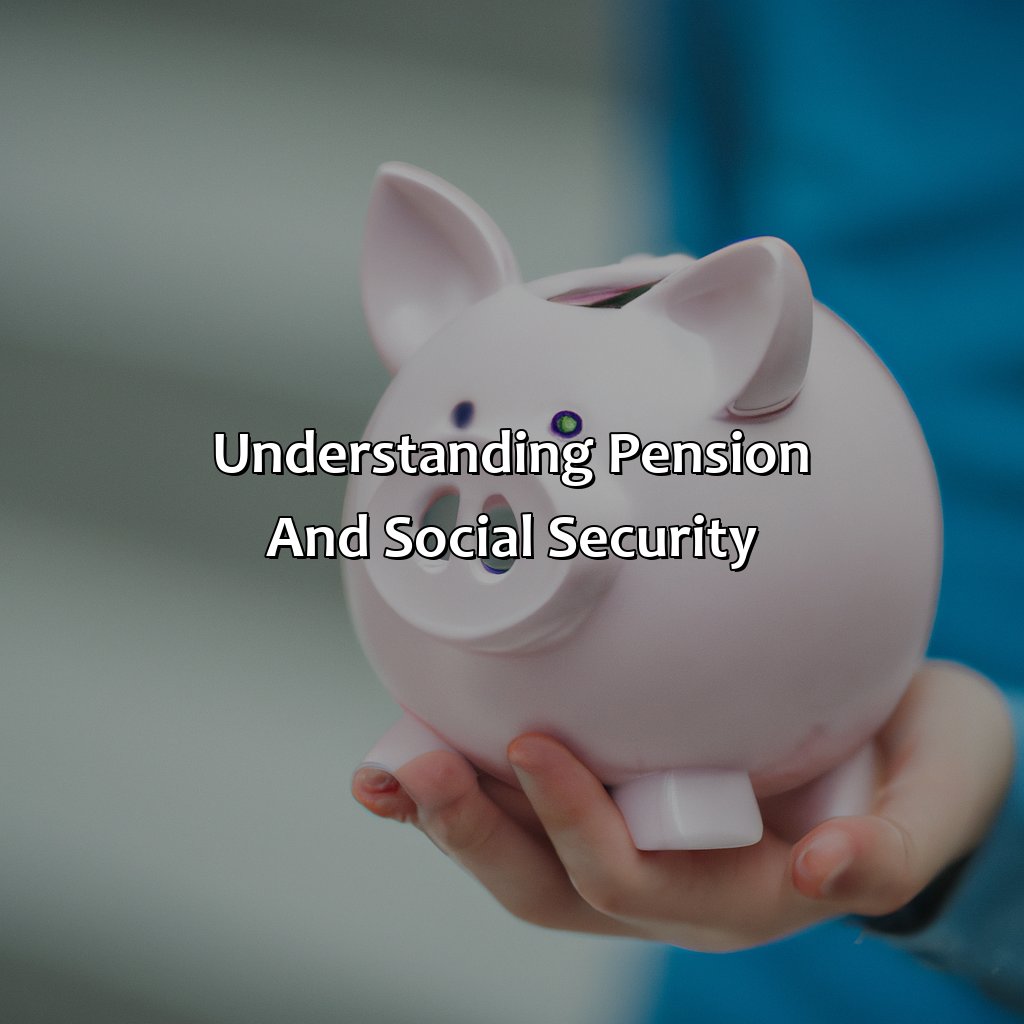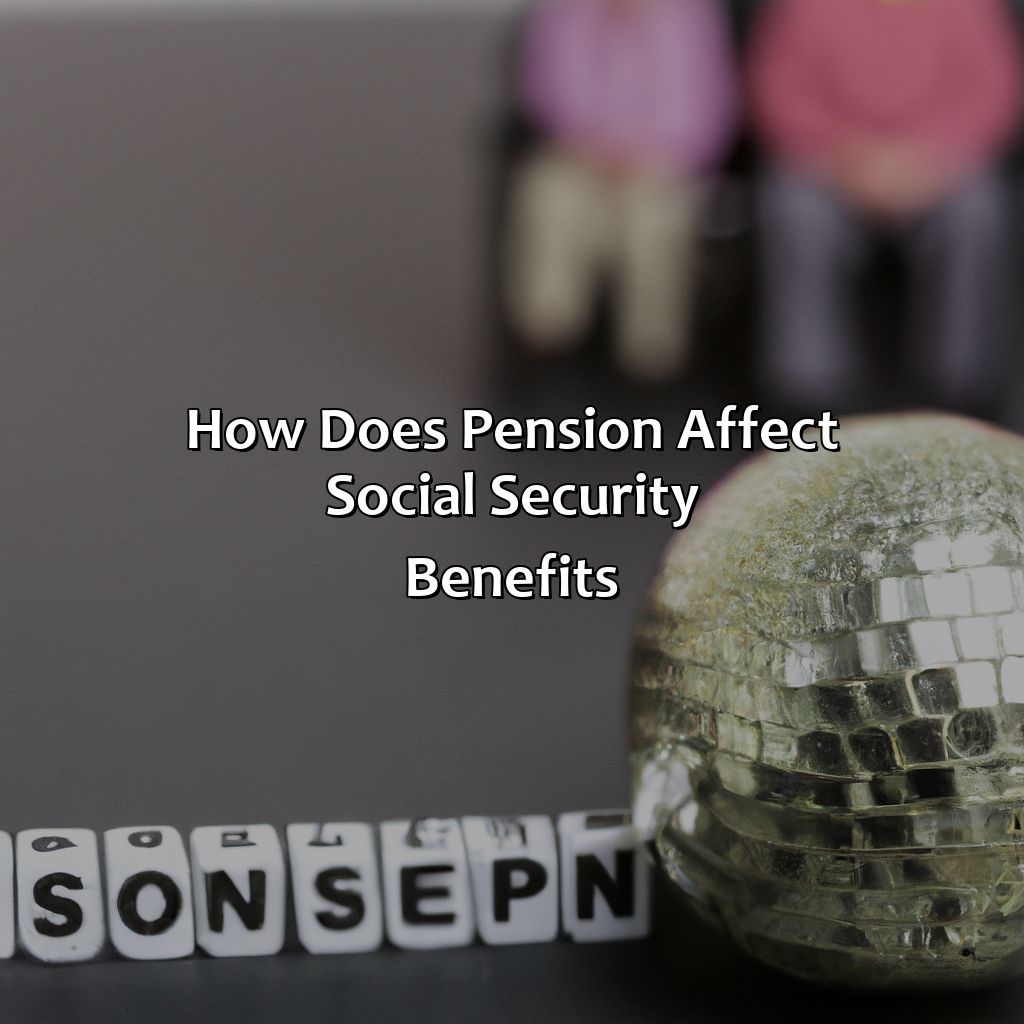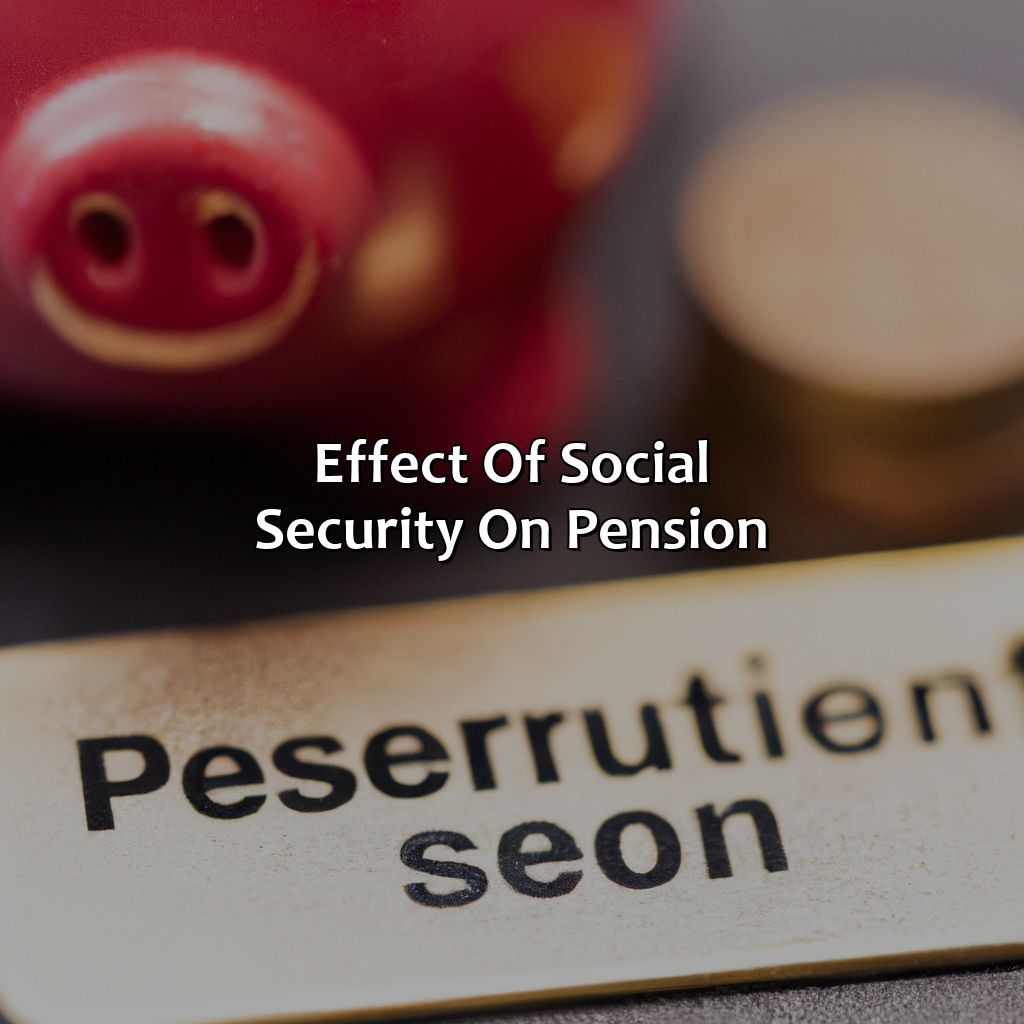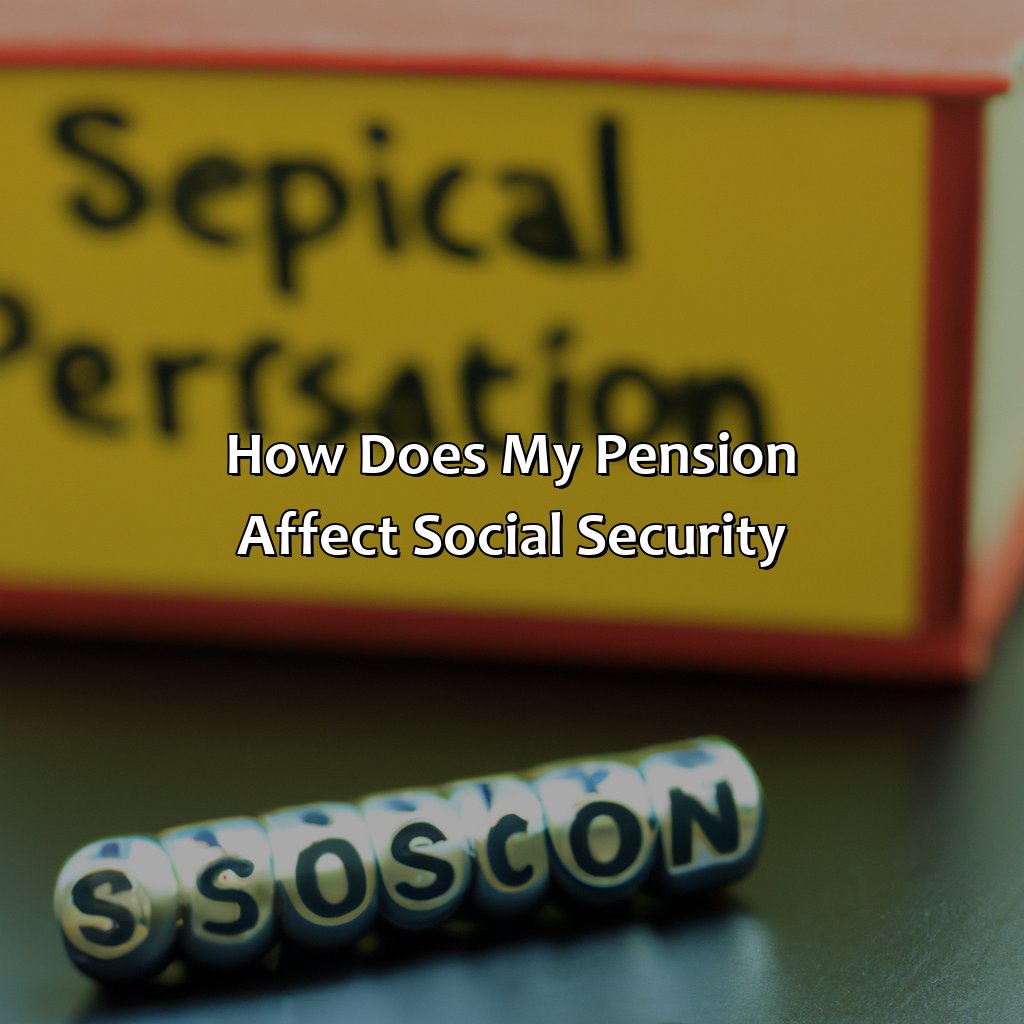How Does My Pension Affect Social Security?
Key Takeaway:
- Understanding how pension affects Social Security benefits is important for retirement planning. Pension benefits earned by an individual can offset Social Security benefits they are eligible for.
- The Windfall Elimination Provision (WEP) can also reduce the Social Security benefits of people who receive pensions from work not covered by Social Security. It’s important to take into account these offset and reduction rules when planning for retirement.
- Social Security may affect the taxation of pension benefits. If a person receives Social Security and has a pension, they may have to pay taxes on some of their Social Security benefits, depending on their income. It’s important to plan ahead for this tax impact.
Are you concerned about how your pension will affect your social security benefits? You’re not alone! This article will discuss the ways in which your pension can affect the amount of social security you receive. Read on to learn more about this important topic.
Understanding Pension and Social Security
Understanding Pension and Social Security:
Pension and Social Security are interlinked, and the benefits one receives from either program can impact the benefits received from the other. Social Security benefits are calculated based on an individual’s average indexed monthly earnings while working, and if you receive a pension, it can affect how much you receive in Social Security benefits. Essentially, if you receive a pension from work not covered by Social Security (e.g., a government agency), the amount of your Social Security benefits may be reduced. This reduction is due to the Windfall Elimination Provision (WEP), which reduces Social Security benefits for individuals who receive pensions from non-Social Security-covered employment. Additionally, if you have worked and paid Social Security taxes long enough to be eligible for both a pension and Social Security benefits, your Social Security benefits may be reduced by the Government Pension Offset (GPO).
It is essential to plan accordingly, as the reduction in Social Security benefits can impact your overall retirement income. There are ways to mitigate these reductions, such as maximizing Social Security benefits early on, delaying the receipt of your pension, or working longer to increase your Social Security benefits. According to the Social Security Administration (SSA), as of November 2021, over 1.8 million people were affected by the GPO.
In summary, receiving a pension can impact the amount of Social Security benefits one receives through the WEP or GPO. It is crucial to plan accordingly and consult with a financial advisor to understand how this may impact your retirement income.

Image credits: retiregenz.com by David Jones
How does Pension affect Social Security benefits?
Understand how your pension affects Social Security Benefits! Dive in! Pension Offset and Windfall Elimination Provision (WEP) are two solutions. Find out how your retirement or pension plan could affect the amount of your Social Security check.

Image credits: retiregenz.com by Joel Duncun
Pension Offset
If you receive a pension, it may affect your Social Security benefits through what is known as Pension Offset. This rule essentially reduces any spousal or survivor benefits by an amount equal to two-thirds of your government or public pension benefit. For example, if your government pension payment is $600 per month, then two-thirds of that would be deducted from any potential Social Security benefits. This can significantly impact the amount you receive in retirement.
It’s important to note that not all pensions will result in a reduction of Social Security benefits. Private sector pensions and some government pensions that have been paid into by both employee and employer will not trigger the Pension Offset rule. Additionally, if your spouse receives a pension that does trigger the Pension Offset rule, it will not necessarily reduce your own Social Security benefits.
It’s also worth mentioning that while the Pension Offset rule may seem unfair to those who have contributed significantly to their government or public pensions, it was put in place to ensure that individuals do not receive more in combined benefits than they would have received from Social Security alone.
According to the Social Security Administration website, “Approximately 610,000 spouses and children receive a benefit based on the earnings record of someone who died receiving monthly survivor’s benefits.” This highlights the importance of understanding how one’s pensions may affect their future financial security.
Looks like my pension and Social Security benefits are in a heated competition to see who can retire first.
Windfall Elimination Provision (WEP)
The Windfall Elimination Provision (WEP) is a computation method used by the Social Security Administration to adjust the benefits of individuals who receive pensions from employment not covered by Social Security. WEP affects those who are qualified for both social security and pension benefits and reduces their social security payments, resulting in a lower overall income.
If an individual has less than 30 years of substantial earnings under Social Security, WEP may be applicable. Generally, the higher the pension amount, the greater impact of WEP on social security payments. The impact varies from person to person, and there is no specific percentage reduction.
Moreover, understanding the calculation method used for determining your total benefit amount can help you plan your finances better. It is important to review your earnings record regularly and notify Social Security when doubts arise.
To ensure that you maximize your benefits with WEP, several suggestions could be useful. Working longer under Social Security coverage or earning higher wages may increase the number of substantial years of earnings calculated towards WEP’s formula, hence resulting in a lesser reduction in social security payments. Another suggestion worth considering is increasing contributions to private retirement plans or establishing additional income streams that have no effect on social security payments.
By implementing these strategies and accessing relevant resources regarding Social Security benefit regulations, individuals can actively manage their finances effectively while maintaining a comfortable lifestyle post-retirement.
Looks like social security and pension have a complicated relationship, just like Ross and Rachel from Friends.
Effect of Social Security on Pension
To fathom the effect Social Security has on your pension, think of delving into the taxation of Social Security profits. Plus, investigate the DRCs (Delayed Retirement Credits). These elements may help you make savvy choices about your retirement income and possible tax responsibility.

Image credits: retiregenz.com by James Woodhock
Taxation of Social Security Benefits
Social Security benefits may be subject to taxation based on an individual’s income level. The amount of taxable benefits can range from 0% to 85%. Taxable income includes not only wages or salaries but also other types of income sources such as pensions, IRA distributions, interest, dividends, and capital gains. It is important for individuals to plan accordingly since unexpected taxes on Social Security benefits can significantly reduce their retirement funds.
One thing people should consider is the effect of their pension on Social Security benefits. If an individual receives a pension from work that was not covered by Social Security, they may be subject to the Windfall Elimination Provision (WEP) or Government Pension Offset (GPO). WEP affects an individual’s own Social Security benefit while GPO affects spousal or survivor benefits. Some states have similar provisions that affect state and local government employees.
It is worth noting that there are exceptions to these rules. Individuals who worked a certain number of years paying into both Social Security and a non-Social Security retirement plan may be exempt from WEP. Similarly, individuals receiving certain types of non-taxable military service pensions are exempt from GPO.
A notable example of taxation on Social Security benefits is during the Reagan administration in the 1980s. Before then, Social Security benefits were not taxed at all. However, under the Tax Equity and Fiscal Responsibility Act (TEFRA) of 1982 signed by President Reagan, up to 50% of an individual’s Social Security benefits could be subject to taxation if their income exceeded certain thresholds. In subsequent years, this percentage increased until it reached the current maximum cap of 85%.
Who needs a nap when you can just delay your retirement and earn some extra credits?
Delayed Retirement Credits (DRCs)
Retirees can increase their benefits by delaying filing for Social Security, resulting in Delayed Collection Credits (DCCs). DCCs will raise monthly checks up to 8% per year beyond full retirement age at 72. Age-based increases apply until age 70, with no additional credits after that date.
Getting old may not be fun, but maximizing your social security and pension can make it a little less miserable.
Strategies to Maximize Social Security and Pension
Maximizing your Social Security and Pension benefits? Planning ahead is key. We’ll go over the strategies that help you get the most out of both programs. Coordinating benefits too is important. It stops any Social Security cutbacks and ensures you get the maximum amount.

Image credits: retiregenz.com by Yuval Washington
Planning Ahead
Planning for Retirement Benefits
It is important to plan for retirement benefits to secure a comfortable future. Strategizing how to maximize both social security and pension can provide better financial options. Understanding how one’s pension influences social security is crucial in devising an effective plan.
Social Security and Pension Relationship
The interaction between social security and pension can be complex and often misunderstood. Having a pension may have an impact on the amount of social security benefits a person receives. It is necessary to evaluate the different scenarios that may occur while planning for comprehensive retirement benefits.
Maximizing Returns
Various strategies can be employed to maximize returns from both social security and pension plans. Delaying the receipt of Social Security payments until full retirement age (FRA) can result in higher payouts, while utilizing spousal benefits can also boost overall earnings. Simultaneously, annuitizing one’s pension funds can create an additional stream of income.
Real Story Example:
Eric, a government employee, had been faithfully contributing towards his pension fund for thirty years before retirement. However, during this time, he did not realize that since he was not part of the Social Security system as a government employee, his eventual Social Security benefit payments would differ substantially from his private-sector peers’. Consequently, Eric’s plan for maximizing his Social Security contributions took a different course than he had initially imagined.
Coordinating benefits is like juggling: you need to balance your pension, Social Security, and savings without dropping the ball.
Coordinating Benefits
When navigating retirement benefits, a critical aspect is coordinating various sources of retirement income. It allows individuals to maximize their Social Security and pension benefits and make the most out of their savings.
The following are essential tips for coordinating various sources of retirement income:
- Combining private pensions with social security
- Understanding spousal benefits
- Tax implications of receiving both forms of benefits
- Utilizing benefit planning tools and resources.
- Timing when to take which benefit (if they’re not earned at the same age)
- Understanding how exceeding the Social Security earnings limit impacts combined income
It is imperative to note that taking certain actions can affect future benefits for pension plans and Social Security. It is necessary to understand how each benefit affects other sources before making any decisions regarding retirement.
To ensure that all bases are covered, it is essential to seek professional financial advice or utilize resources like online benefit calculators to develop a comprehensive plan that maximizes one’s overall retirement income.
Don’t wait until it’s too late! Take control of your future now by taking the necessary steps towards optimizing your retirement.
Five Facts About How Does My Pension Affect Social Security:
Your pension may affect the amount of Social Security benefits you receive. (Source: Social Security Administration)
The Windfall Elimination Provision may reduce your Social Security benefits if you have a pension from work not covered by Social Security. (Source: Social Security Administration)
The Government Pension Offset may affect spousal or survivor benefits if you receive a pension from a government job not covered by Social Security. (Source: Social Security Administration)
Pension income may affect the taxation of Social Security benefits. (Source: AARP)
You can use the Social Security Administration’s WEP and GPO calculators to estimate how your pension may affect your Social Security benefits. (Source: Social Security Administration)
FAQs about How Does My Pension Affect Social Security?
How does my pension affect social security?
Your pension may affect your social security benefits, depending on the type of pension plan you have. If you have a pension from a government job where you did not pay Social Security taxes, it may reduce your Social Security benefits.
How can I find out if my pension will impact my social security benefits?
You can contact the Social Security Administration to inquire about the Windfall Elimination Provision (WEP) or Government Pension Offset (GPO) that may apply to your pension. You can also use the online WEP and GPO calculators provided by the Social Security Administration.
What is the Windfall Elimination Provision (WEP)?
The Windfall Elimination Provision may apply to individuals who worked in a job where they did not pay Social Security taxes but are now eligible for Social Security benefits based on a different job where they did pay Social Security taxes. The WEP reduces the Social Security benefit for these individuals.
What is the Government Pension Offset (GPO)?
The Government Pension Offset affects individuals who receive a pension from a government job where they did not pay Social Security taxes and are also eligible for Social Security benefits based on their spouse’s or ex-spouse’s work record. The GPO reduces the Social Security benefit for these individuals.
Can I still receive social security benefits if I have a pension?
Yes, you can still receive Social Security benefits even if you have a pension. However, your pension may reduce the amount of your Social Security benefits.
What other factors can reduce my social security benefits?
In addition to a pension, other factors that can reduce your Social Security benefits include working while receiving retirement benefits, claiming Social Security before reaching full retirement age, and owing money to the Social Security Administration or other federal agencies.
 Checkout this IRS Loophole
Checkout this IRS Loophole 
